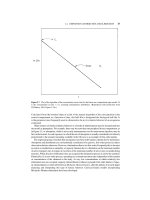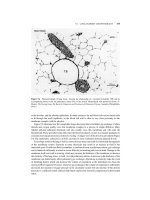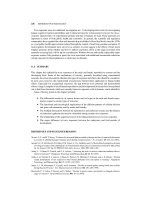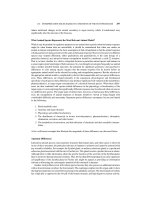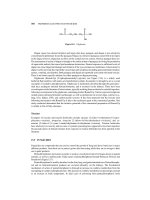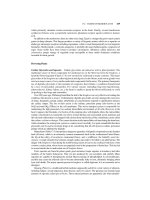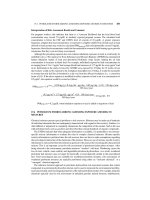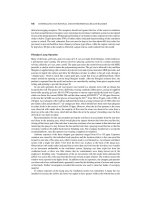Leading project teams the basics of project management and team leadership 2nd edition cobb test bank
Bạn đang xem bản rút gọn của tài liệu. Xem và tải ngay bản đầy đủ của tài liệu tại đây (165.45 KB, 8 trang )
Cobb – Leading Project Teams, 2e
Instructor Resources
Chapter 2: Determining the Direction and Initial Specifications of a Project
True/False
1. When any client brings a project to a project leader, the leader needs to develop an initial
overview plan of the project.
ANS: T
2. Mission statements play more than one role in a project.
ANS: T
3. As a project moves forward, project members tend to focus strictly on the overall goal of the
project.
ANS: F
4. A project has only one stakeholder with a vested interest in its mission and how it will be
achieved.
ANS: F
5. Clients’ generally want their needs met as much as possible and as quickly as possible,
regardless of price.
ANS: F
6. The host organization is the reason why a project exists.
ANS: F
7. Organizations quite often undertake projects for their own purposes.
ANS: T
8. The overriding interest of a project team is to be able to complete the project within time and
costs allowed.
ANS: T
9. It is not necessary for leaders to identify all the key stakeholders of a project.
ANS: F
1.
10. “Key stakeholders” are represented by individuals who have the ability to make important
decisions about the project.
ANS: T
11. The specific outcomes achieved to fulfill the mission of a project are regarded as the
project’s objectives.
ANS: T
12. Authority—one of the key project resources—can be gained from higher-level management
of the host organization.
ANS: T
13. Generally speaking, clients want projects done more quickly than project teams.
ANS: T
14. It is common that outside clients will overestimate the true costs of a project.
ANS: F
15. Project costs alone affect what deliverables are possible.
ANS: F
16. A project charter is a description of a project that formally authorizes it to proceed.
ANS: T
17. A project charter is kept as short as possible and describes the project only in brief.
ANS: F
18. When the project charter is formally accepted by key stakeholders, the project can move
ahead as planned.
ANS: T
19. The project's objectives denote what the project is trying to achieve in broad terms.
ANS: F
20. A project’s mission is to help address some client’s need or solve some client’s problem.
ANS: T
2
Multiple Choice
1. Mission statements state the ______ of a project.
a) Execution stage
b) Overall goals
c) Conclusion
d) Explicit details
ANS: b
2. Which of the following is not clarified in a mission statement?
a) Goals
b) Financial returns
c) Aims
d) Direction
ANS: b
3. Which of the following stakeholders provides the reason for a project’s existence?
a) Suppliers
b) Host organization
c) The client
d) Team members
ANS: c
4. Which of the following is generally not one of the project’s stakeholders?
a) The end users
b) The media
c) The client
d) The suppliers
ANS: b
5. Projects may also have internal suppliers in the host organization who may be called on to
help supply
a) Space and personnel only
b) Information and space only
c) Space, personnel and information
d) Only information
ANS: c
3
6. Which of the following is generally the interest of external or outside suppliers in a project?
a) Not being overloaded
b) Having their needs met as quickly as possible
c) Increasing their revenues
d) Keeping the project running smoothly
ANS: c
7. “Key stakeholders” have which of the following attributes when they make important
decisions regarding the project?
a) Power and money
b) Power and authority
c) Ability and authority
d) Ability and money
ANS: b
8. When clients first present their project idea, they are quite often
a) Well thought out
b) Too precise
c) Ambiguous
d) None of the above
ANS: c
9. What are the roles played by a project’s objectives and deliverables?
a) Helping the client define goals
b) Providing team direction
c) Helping achieve stakeholder agreement
d) All of the above
ANS: d
10. Which of the following is not a role played by a project’s objective & deliverables?
a) Helping the client
b) Providing team direction
c) Securing stakeholder agreement
d) Ensuring team member satisfaction
ANS: d
11. What does SMART stand for?
a) Simple, Measurable, Accurate, Reasonable, Time delimited
b) Specific, Measurable, Actionable, Realistic, Time delimited
4
c) Specific, Meaningful, Actionable, Realistic, Time delimited
d) Simple, Measurable, Accurate, Reasonable, Time delimited
ANS: b
12. A project’s scope includes
a) The human resources needed to complete the project.
b) All the cost considerations of a project
c) The four actionable tasks of the project
d) All those tasks necessary to complete the project
ANS: d
13. Project _________ address the products and services that will be produced in the efforts to
reach project objectives.
a) Resources
b) Risks
c) Deliverables
d) Tasks
ANS: c
14. Which of the following is least likely to be concerned with the cost allocations of a project?
a) Host organization
b) End users
c) Clients
d) Project teams
ANS: b
15. At an early stage, project leaders should check out all the following attributes of future team
members except:
a) Age
b) Knowledge
c) Skills
d) Abilities
ANS: a
16. Which of the following stakeholders is likely to underestimate true project costs even though
concerned about them?
a) Clients
b) Suppliers
c) Advertising agent
5
d) End users
ANS: a
17. Which of the following is described in a project charter?
a) Mission of the project
b) Objectives and deliverables
c) Time and budget
d) All of the above
ANS: d
18. The team members want to see the project become a success, of course, but they would like
not to be _______ in doing so.
a) Overstretched
b) Overcommitted
c) Both of the above
d) None of the above
ANS: c
19. The project charter describes
a) What the project is trying to achieve
b) Project costs
c) The project’s schedule
d) All of the above
ANS: d
20. Once a project’s mission, objectives, and _______ have clarified its direction, project leaders
need to make initial assessments of a project's work requirements.
a) Deliverables
b) Cost
c) Timeline
d) All of the above
ANS: a
6
Short Essay
21. SMART stands for five attributes of good objectives. List three of them and give an example
of each.
22. What are project’s objectives and deliverables? Give an example of each one.
23. The author told a story about an MBA student who promised a client satisfaction with project
deliverables. What lessons were learned from that story?
24. What purposes does a project charter serve?
25. What are two major roles of a mission statement and why are they important?
26. Name one stakeholder of a project and describe that stakeholder’s vested interests in the
project’s mission.
27. What is the scope of a project and why is it important?
28. How does defining the project’s objectives and deliverables help the project team?
29. If you were to prepare a project charter, what details would you include in your charter and
why?
30. How does a project mission statement help establish and maintain project direction?
31. Discuss an example of a situation where the project’s client and the host organization are one
and the same.
32. Why should key stakeholders command more of the project leader’s time and attention?
33. How do a project’s mission, objectives, and deliverables differ from each other? How do they
relate?
34. Why is information an important project resource?
35. List and describe at least three things that should be included in a project plan.
7
36. How should a project leader respond when people are “volunteered” for the project team?
37. Discuss ways that project leaders can minimize the underestimating of project costs by
outside clients.
38. Compare and contrast the major interests of the client and the project team.
39. Why is it important that mission statement be designed with stakeholders’ advice and
consent?
40. How do the development of specific project objectives and deliverables help the client?
8

